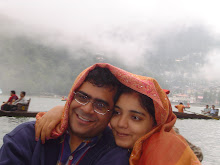But on the other hand, the carnage in Gaza has really left me feeling hollow. To think that a country can impose an economic blockade on its own occupied territory, and then when that blockade is resisted go in and kill more than a thousand, wound several thousand, leave as many as 30,000 homeless... It's terrible and makes one wonder if we as a species have really progressed since the time of the crusades, or Genghis Khan or Hitler. The fact that it is all done with U.S. money and U.S. political support means that all of us are ultimately responsible for this carnage.
Two articles caught my attention today. The first, on the BBC website, shows Ban Ki-moon, secretary General of the UN and a man not known for emotional outbursts to say the least, completely losing control while talking to journalists in Gaza about the devastation.
Appearing stern and at times angry, Mr Ban called the attacks on Gaza "outrageous" and demanded guarantees that it would never happen again.
"I have protested many times. I am today protesting again in the strongest terms. I have asked (for a) full investigation and (to) make those responsible people accountable," he said.
"I am just appalled. I am not able to describe how I am feeling. This was an outrageous and totally unacceptable attack against the United Nations."
Israeli shells hit the UN headquarters as well as two UN schools during the recent three-week offensive. The headquarters were badly damaged and nearly 40 people were killed near one of the schools.
The second article, on Al-Jazeera, shows that the main political fallout of the war is that all the various factions in Gaza are uniting behind Hamas.
The al-Aqsa Martyr's Brigade, an armed wing of Fatah, once threatened to kill Khalid Meshaal, the leader of Hamas.
However, from the beginning of the war on Gaza up to the ceasefire called by Palestinian factions on Sunday, it was fighting shoulder to shoulder with its former rival, lobbing rockets into Israel from the beleaguered coastal strip, Fatah representatives in Damascus say.
Israel says it has dealt Hamas a crippling blow, but its 22-day onslaught that killed around 1,300 civilians and injured at least 6,000 more has brought together a slew of Palestinian factions, many of them previously sworn enemies of Hamas.
Many observers are left wondering if the Hamas-allied coalition will be a new front against Israel and whether Hamas will be able to prevent other factions from launching attacks from Gaza, breaking the fragile calm.
"Israel's aggression on Gaza has unified the Palestinian groups in the face of the Zionist aggression," says Mohammed Nazzal, a member of Hamas' political bureau in Damascus.
This was completely predictable, of course. When your people are under attack, political differences matter less. The important thing is to get together and fight to protect your homes and your families, and if Hamas is leading the defense, then you fight with Hamas.
Since there's been so much talk of Dr. Martin Luther King around Obama and the inauguration, it's important to remember what he said about wars of aggression. King is most known for his "I have a Dream" speech, but in my mind, this speech given April 1967 - a year to the day before he died - was even more important. The entire speech is worth reading, but for me the most important line is:
As I have walked among the desperate, rejected and angry young men I have told them that Molotov cocktails and rifles would not solve their problems. I have tried to offer them my deepest compassion while maintaining my conviction that social change comes most meaningfully through nonviolent action. But they asked -- and rightly so -- what about Vietnam? They asked if our own nation wasn't using massive doses of violence to solve its problems, to bring about the changes it wanted. Their questions hit home, and I knew that I could never again raise my voice against the violence of the oppressed in the ghettos without having first spoken clearly to the greatest purveyor of violence in the world today -- my own government. For the sake of those boys, for the sake of this government, for the sake of hundreds of thousands trembling under our violence, I cannot be silent.
And neither can we.
Here's the first part of the speech. For the rest, you can go here.

No comments:
Post a Comment